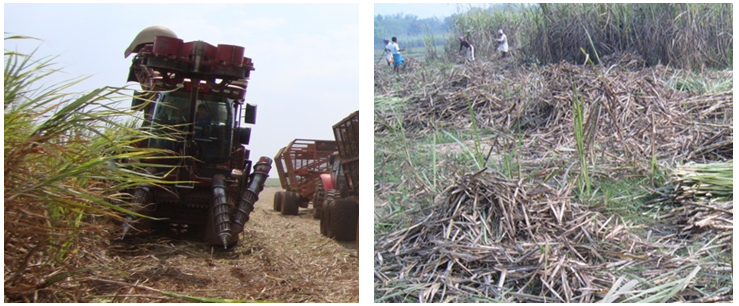Assessing the sustainability of bioethanol production in different development contexts: a systems approach
This research project provides insights on the sustainability of the bioethanol production and the potential role of the industry to mitigate climate change, improve energy security and promote sustainable development in different country contexts. In particular, country cases are developed for Brazil and Nepal, as well as methodological contributions for assessing the sustainability of biofuels production in connection with energy and climate policies.

Background to the project
The continuous depletion of fossil fuel reserves, the global agenda on climate change and threats to energy security have led to increased global interest in the exploration, production and utilization of bioenergy and biofuels. Access to modern bioenergy carriers derived from the efficient conversion of locally available biomass resources is indispensable for economic growth, rural development and sustainable development in developing countries. Deployment of bioenergy/biofuels technologies has significantly varied across the globe. Developing countries are still highly dependent on traditional biomass technologies with low conversion efficiency, which are typically associated with significant environmental and health impacts. Meanwhile, emerging economies and developed countries are progressively promoting biofuel industries and international trade. They are also engaged in making biofuels a sustainable proposition by developing sustainability criteria.
Objectives
The goal of this project is to address the sustainability of bioethanol production derived from one of the most important feedstocks being used for biofuels: sugarcane. This is done by analyzing different development contexts and environmental constraints in terms of geopolitical situation, economic development and state-of-the-art technologies in agro-industrial development. Life cycle assessment (LCA), system studies, and techno-economic optimization are the main methodological approaches applied in the research.
Summary of accomplishments
This project primarily addresses three key questions for analyzing the sustainability of bioethanol production. The first research question investigates the key parameters affecting the sustainability of bioethanol production and use in a low-income country using the case of Nepal. The net energy and greenhouse gas (GHG) balances are identified to be the main sustainability criteria of the sugarcane-molasses bioethanol. Results of the lifecycle studies show that the production of bioethanol was energy-efficient in terms of the fossil fuel inputs required to produce the renewable fuel. Greenhouse gas (GHG) emissions from the production and combustion of ethanol are also lower than those from gasoline. The study also evaluates the socio-economic and environmental benefits of ethanol production and use in Nepal, concluding that the major sustainability indicators were in line with the goals of sustainable development. Assessment of the biofuel (molasses-bioethanol) sustainability in Nepal is the first of its kind in low-income countries.
The second question critically evaluates methodologies for accounting the lifecycle GHG emissions of Brazilian sugarcane ethanol in European and American regulations, depicting commonalities and differences among them. GHG emissions are becoming increasingly important as part of sustainability criteria in the context of the expansion of biofuel production and international trade. However, different methodologies still lead to quite different results and interpretation. To make this an operational criterion for international comparisons, it is necessary to establish unified methodological procedures for accounting GHG emissions. The project identifies major issues that need to be addressed for establishing methodological coherence. These include N2O emissions from agricultural practices, bioelectricity credits in fuel production, and modelling approaches in estimating emissions related to direct and indirect land use change (LUC & iLUC).
The third research question investigates how the sugarcane bioethanol industry can be developed in terms of energy security and the diversification of energy sources. The case of complementarity between bioelectricity and hydropower is evaluated in the cases of Nepal and Brazil. Bioelectricity could offer a significant share of electricity supply in both countries provided that favorable political and institutional conditions are applied. Finally, in order to find the choice of technological options for the production of second generation (2G) bioethanol and/or of bioelectricity, a techno-economic optimization study on the bulk of sugarcane bio-refineries in Brazil was carried out, taking into account the entire lifecycle costs, emissions, and international trade. The study shows that it is worthwhile to upgrade sugarcane bio-refineries. Energy prices, type of power generation systems, biofuel support and carbon tax, and conversion efficiencies are the major factors influencing the technological choice and potential bioethanol trade.
Keywords: bioenergy and biofuel, bioethanol industry, development trend, sustainability assessment, climate change mitigation, energy security, life cycle assessment, systems optimization
Project leader
Prof. Semida Silveira
Researchers
Prof. Semida Silveira
Dr. Dilip Khatiwada
Publications
Khatiwada, D., 2013. Assessing the sustainability of bioethanol production in different development contexts: A systems approach. PhD Thesis in Energy Technology/Energy and Climate Studies. KTH Royal Institute of Technology, Sweden. https://www.diva-portal.org/smash/get/diva2:640326/FULLTEXT01.pdf
Khatiwada, D., Leduc, S., Silveira, S., McCallum, I., 2016. Optimizing ethanol and bioelectricity production in sugarcane biorefineries in Brazil. Renewable Energy 85, pp. 371-386. doi:10.1016/j.renene.2015.06.009
Khatiwada, D., Seabra, J., Silveira, S., Walter, A., 2012. Power generation from sugarcane biomass- A complementary option to hydroelectricity in Nepal and Brazil. Energy 48 (1), pp. 241–254. doi:10.1016/j.energy.2012.03.015
Khatiwada, D., Seabra, J., Silveira, S., Walter, A., 2012. Accounting greenhouse gas emissions in the lifecycle of Brazilian sugarcane bioethanol: Methodological references in European and American regulations. Energy policy 47, pp. 384–397. doi:10.1016/j.enpol.2012.05.005
Khatiwada, D., Silveira, S., 2011. Greenhouse gas balances of molasses based ethanol in Nepal, Journal of Cleaner Production 19 (13), pp. 1471-1485.doi:10.1016/j.jclepro.2011.04.012
Silveira, S., Khatiwada, D., 2010. Ethanol Production and Fuel Substitution in Nepal - Opportunity to Promote Sustainable Development and Climate Change Mitigation. Renewable and Sustainable Energy Reviews 14 (6), pp. 1644-1652. doi:10.1016/j.rser.2010.03.004
Khatiwada, D., Silveira, S., 2009. Net energy balance of molasses based ethanol: the case of Nepal. Renewable and Sustainable Energy Reviews 13 (9), pp. 2515 - 2524. doi:10.1016/j.rser.2009.06.028
